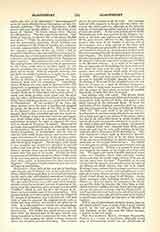

Glebe (Lat. gloeba) originally signified, in common law, any farm, estate, or parcel of land, and the word is so used in the Theodosian Code. But in ecclesiastical law it has become the technical term for land permanently assigned for the maintenance of the incumbent of a parish, and is the oldest form of parochial endowment. This use of the word is found in numerous medieval charters, of which Du Cange gives a few examples, and formerly no church could be consecrated unless thus endowed with a house and glebe. The fee-simple was held to be in abeyance, that is, without an owner in the eyes of the law, but the freehold belonged to the incumbent. It could be leased, sold, or exchanged, with the bishop’s consent, and was sometimes allowed to be mortgaged for the purpose of repairing the parsonage or church. In England and Scotland, where glebe is held by the established Churches of those countries, there are now special laws regarding the leasing, sale, or exchange of such property, and all such transactions are subject to the approval of the land commissioners. In the Catholic Church, glebe, where it exists, is regarded as mensal property, and canon law regulates the conditions which govern its possession. The alienation of mensal property is now held by most legists to require the special permission of the pope, and even then only certain justifying causes are recognized, viz: (I) necessity, as when a church is overburdened with debt; (2) utility, or the opening for an advantageous exchange; (3) to redeem captives or feed the poor in time of famine; (4) convenience, as when the land is so situated that its produce cannot be gathered without great expense. Certain specified formalities have also to be compiled with.
G. CYPRIAN ALSTON

